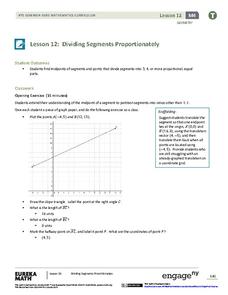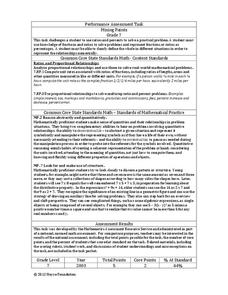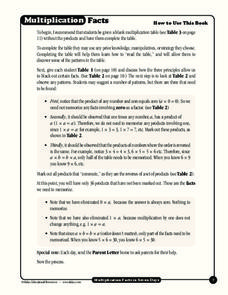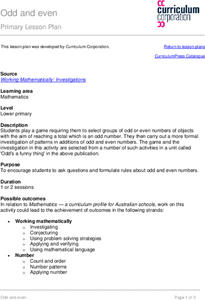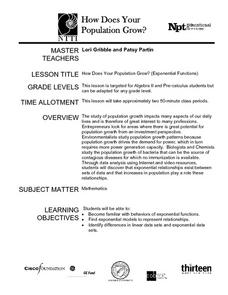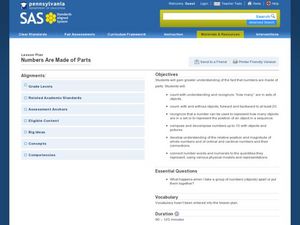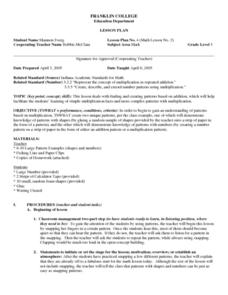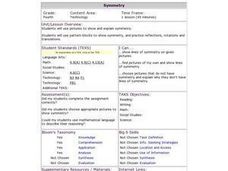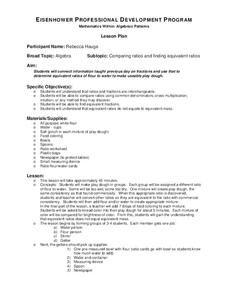EngageNY
Dividing Segments Proportionately
Fractions, ratios, and proportions: what do they have to do with segments? Scholars discover the midpoint formula through coordinate geometry. Next, they expand on the formula to apply it to dividing the segment into different ratios and...
Noyce Foundation
Mixing Paints
Let's paint the town equal parts yellow and violet, or simply brown. Pupils calculate the amount of blue and red paint needed to make six quarts of brown paint. Individuals then explain how they determined the percentage of the brown...
Curated OER
Train Game
In this division and multiplication worksheet, 5th graders complete, by multiple choice, 4 division sentences by choosing the correct quotient from the cars in the train yard. Students choose, by multiple choice, the missing factor in 4...
Curated OER
Sliding Along
Third graders explore the concept of linear measurements and how they work. Coins are used to reinforce the process.
Didax
Multiplication Facts
Learning their multiplication facts is a big step in the education of young mathematicians. Help achieve this goal with the support of this collection of instructional materials.
Curated OER
Same As
Explore the concept of the equals symbol. In this mathematical symbols lesson, learners discover the meaning of the equals sign (symbol). They also construct addition and subtraction sentences to understand the concept of equal parts.
Curated OER
Class of Gold
How can you see a number in nature? Here, learners discover both Fibonacci numbers and the golden ratio by exploring a number of different resources. Note: Some of the resources are older and may be missing some of the links, but the...
Curated OER
Odd and even
Learners play a game requiring them to select groups of odd or even numbers of objects with the aim of reaching a total which is an odd number. They carry out a more formal investigation of patterns in additions of odd and even numbers.
Curated OER
How Does Your Population Grown?
Do you know how the population has grown of your community? Can you predict the population over the next half century? Can we find an algebraic model that matches our data? These along with many more questions can be researched by...
Pennsylvania Department of Education
Numbers Are Made of Parts
Children play with barnyard animal cards to practice composing and decomposing numbers. With their "secret number" of animal cards in a cup, they shake and spill them onto a barn story board, counting how many animals fall in the barn...
Ms. Amber Nakamura's Mathematics Website
Algebra Project
What would your dream house look like? A cottage? A medieval castle? High schoolers enrolled in Algebra design the perfect house while using slopes to write equations for various aspects of the project.
Curated OER
Finding and Creating Addition Patterns
Third graders listen as teacher snaps her fingers in a certain pattern and then join in as they become familiar with the pattern and then repeating it. They observe a patterns of shapes and repeat after the teacher has explained it....
Curated OER
Finding Sums to 6
Students explore the additive identity property where they add multiple numbers to get to the number 6. In this number 6 lesson plan, students also work on their addition charts.
National Council of Teachers of Mathematics
How Many Triangles?
For this triangles activity, learners problem solve and shade triangles within other triangles. Students complete two problems.
Curated OER
Patterns, Relations And Functions
Fourth graders observe patterns and determine a mathematical function that creates the pattern. Through a demonstration by the teacher, they observe strategies such as multiplication, division, addition, and subtraction to use when...
Curated OER
Identify the Pattern
Third graders develop a pattern using bean bags. They could kick the bean bag in the air with their left leg a certain number of times, etc. They work in pairs and trade off completely the patterns with one another.
Curated OER
Patterns
Students explore the concept of linear patterns by moving into different body poses. They also use MathKeys software to create linear patterns across a computer screen. In groups of three they take turns adding to the pattern.
Curated OER
The Hundred Penny Box
Young scholars recognize the pattern established year after year with the special coin dated appropriately
Curated OER
Math/Technology: Symmetry
Fourth graders, using KidPix, use stamps and pencil tools to illustrate which pictures have symmetry. They add text boxes to explain their answers in math terms. Students practice skills in rotation, reflection, and translation on an...
Curated OER
Dog Salmon Lesson Three
Students observe patterns and scale sizes on the salmon skin. They explore the tanning of salmon skills and practice the Athabascan terms for the salmon parts. They make salmon skin prints.
Curated OER
Grade 5: Multiple Towers
Fifth graders use interlocking cubes to build towers to represent factors of numbers and place the towers in the appropriate places on a Tower chart in order to look for patterns. They work in partner groups, and finish by writing...
Mathematics TEKS Toolkit
Grade 6: Exploring c/d = pi
Introduce your math class to the perimeter of a circle. Teach them that pi describes the relationship between the circumference and the diameter. As a hands-on investigation, pairs or small groups use string to compare these two values...
Curated OER
Volume and Surface Area: Which Is More?
Students explore the volume and surface area of three dimensional figures. Through the use of video, students discover three dimensional shapes, their uses in real-life applications, and methods used to calculate their volume and surface...
Curated OER
Mathematics Within: Algebraic Patterns
Students comprehend that ratios and fractions are interchangeable. They compare ratios using common denominators, cross multiplication, and intuition. Students find equivalent fractions. They comprehend that equivalent ratios do not...


